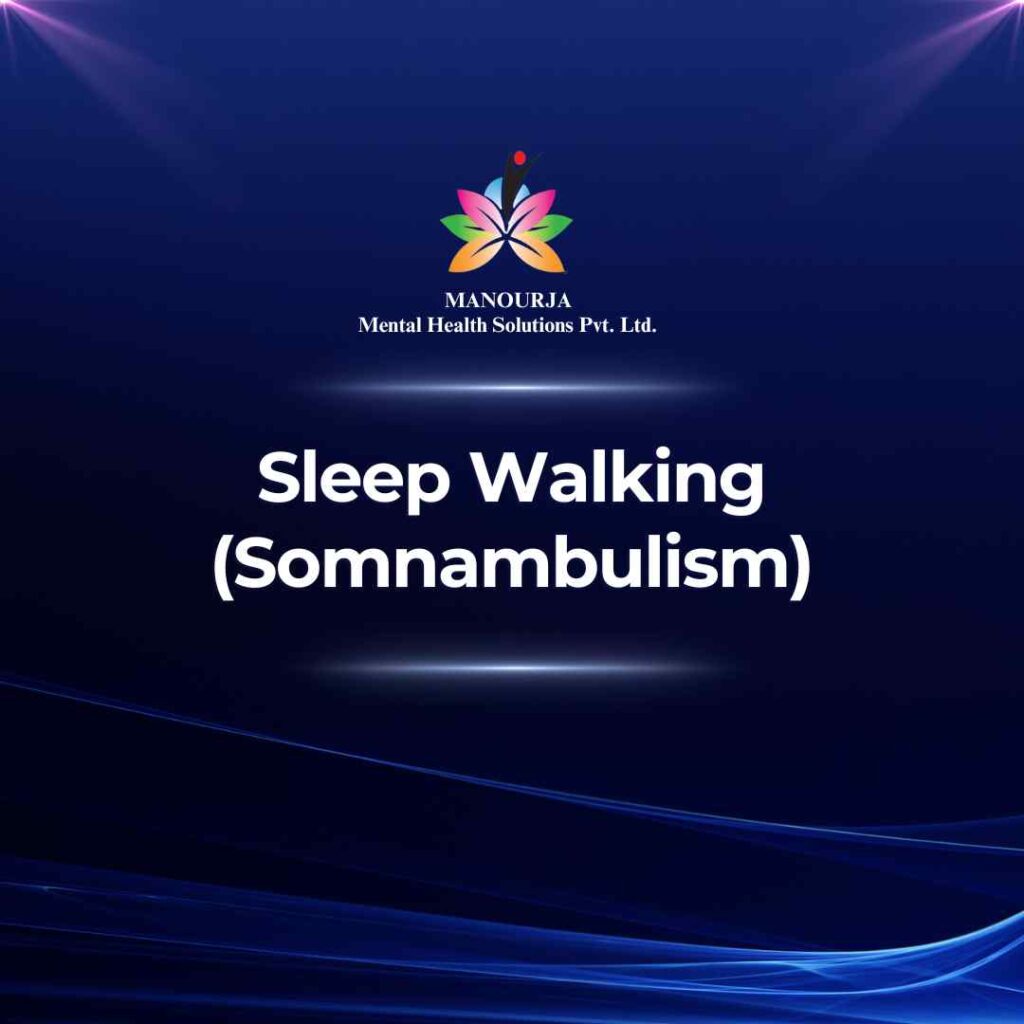Sleep walking (Somnambulism)

Sleepwalking (Somnambulism) is a behavior disorder that originates during deep sleep and results in walking or performing other complex behaviors while asleep. It is more common in children than adults and is considered a type of parasomnia—an undesirable behavior or experience during sleep.
Symptoms of Sleepwalking
- Ambulation (Walking) During Sleep: The most obvious sign of sleepwalking is walking during sleep, which can occur in the first few hours after falling asleep when the person is in deep sleep stages.
- Other Complex Behaviors: Besides walking, sleepwalkers may perform other complex tasks, such as rearranging furniture, opening closets, eating, or even leaving the house. These activities are performed while the person is still mostly asleep and can range from mundane to bizarre.
- Unresponsiveness: During episodes, sleepwalkers usually do not respond to others’ attempts to communicate with them and typically have a blank, staring face.
- No Memory of the Episode: Sleepwalkers often have no recollection of their actions. If they are awakened during an episode, they may be disoriented or confused for a few minutes.
- Possible Dangerous Activities: There is a potential for harm depending on what the sleepwalker does during episodes, such as walking out of the house, going downstairs, or handling sharp objects.
Forms of Sleepwalking
Sleepwalking generally involves a single category, but the activities involved can vary widely from person to person. However, the disorder can sometimes be associated with other sleep disorders, especially in adults, such as sleep apnea, restless legs syndrome, or migraine headaches.
Treatment of Sleepwalking
Most cases of sleepwalking, especially in children, do not require extensive treatment beyond safety measures. However, treatment strategies may be considered in more severe cases or when it persists into adulthood:
Safety Measures: Safety is crucial in managing sleepwalking. This can include:
- Securing windows and doors.
- Removing sharp objects or hazardous materials from accessible areas.
- Placing alarms on doors that can alert others when a sleepwalker is moving about.
Improved Sleep Habits: Establishing a regular, relaxing bedtime routine can help reduce the frequency of sleepwalking episodes. This includes going to bed at the same time every night, ensuring a comfortable sleep environment, and avoiding stimulants like caffeine close to bedtime.
Scheduled Awakenings: This method involves waking the sleepwalker approximately 15-30 minutes before the usual time of the sleepwalking episodes, then keeping them awake through the time during which the episodes typically occur.
Stress Reduction: Since stress can be a trigger for sleepwalking, techniques for relaxation and stress reduction can be helpful. This might include therapy, relaxation techniques, or physical activities.
Medication: In adults with severe or potentially dangerous sleepwalking, medication might be necessary. Benzodiazepines (like clonazepam) or antidepressants are sometimes prescribed to help reduce episodes.
Mental Health Evaluation: For some, sleepwalking might be associated with an underlying psychological issue. A psychological evaluation can help address any significant mental health concerns.
Monitoring and Supervision: Particularly in children, monitoring and supervision are often sufficient to manage sleepwalking without further intervention.
Treatment should always be tailored to the individual, considering the severity and frequency of the episodes as well as the presence of other possible sleep disorders. Consultation with a healthcare provider or sleep specialist is recommended to determine the appropriate course of action.
At MANOURJA, we believe in the transformative power of counseling. Our experienced therapists offer a safe and supportive space where you can explore your thoughts, emotions, and challenges. Through personalized counselling sessions, we’ll work together to develop coping strategies, build resilience, and achieve lasting positive change. Discover the path to a healthier, happier you with MANOURJA counselling services.
MANOURJA Rehabilitation Services
At MANOURJA, we’re dedicated to helping you in rebuild your life, after difficult times. Our rehabilitation services focus on understanding what you need to move forward, whether you’re recovering from addiction, trauma, or any psychological – social challenges. We create personalized plans, that are all about helping you, regain your strength and find hope again. With a caring team by your side, you’ll have the support to make real progress and take steps toward a brighter, healthier future.
